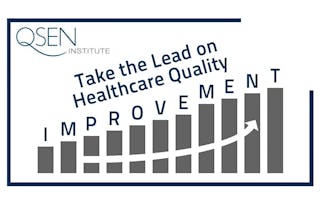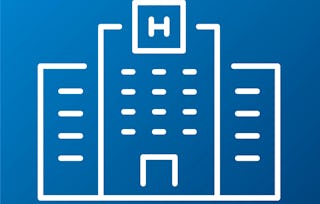Dans ce cours, vous découvrirez l'importance de mesurer la qualité des soins et les résultats en matière de santé afin de déterminer si les initiatives d'amélioration de la qualité (AQ) ont atteint leurs objectifs. Vous apprendrez comment les données sont utilisées pour identifier les domaines d'amélioration et l'importance d'utiliser des données quantitatives et qualitatives pour évaluer le changement. Vous apprendrez les méthodes spécifiques appropriées à l'amélioration par rapport aux méthodes plus adaptées à la recherche, y compris la manière de concevoir des systèmes de mesure adaptés aux initiatives d'amélioration

Cela se termine bientôt : Obtenez des compétences de niveau supérieur avec Coursera Plus pour 199 $ (régulièrement 399 $). Économisez maintenant.

Utiliser les données pour améliorer les soins de santé
Ce cours fait partie de Spécialisation Amélioration de la qualité des soins de santé

Instructeur : Dr Thomas Woodcock
1 816 déjà inscrits
Inclus avec
(45 avis)
Expérience recommandée
Compétences que vous acquerrez
- Catégorie : Recherche qualitative
- Catégorie : Prise de décision fondée sur les données
- Catégorie : Systèmes de mesure
- Catégorie : Recherche quantitative
- Catégorie : Méthodes statistiques
- Catégorie : Informatique de santé
- Catégorie : Graphique d'exécution
- Catégorie : Analyse des séries temporelles et prévisions
- Catégorie : Analyse des Données
- Catégorie : Collecte de données
- Catégorie : Amélioration continue de la qualité (ACQ)
Détails à connaître

Ajouter à votre profil LinkedIn
7 devoirs
Découvrez comment les employés des entreprises prestigieuses maîtrisent des compétences recherchées

Élaborez votre expertise du sujet
- Apprenez de nouveaux concepts auprès d'experts du secteur
- Acquérez une compréhension de base d'un sujet ou d'un outil
- Développez des compétences professionnelles avec des projets pratiques
- Obtenez un certificat professionnel partageable

Il y a 4 modules dans ce cours
Dans ce module, vous découvrirez l'importance de mesurer la qualité des soins et les résultats en matière de santé afin de déterminer si les initiatives d'amélioration de la qualité ont atteint leurs objectifs. Vous apprendrez comment les données sont utilisées pour identifier les domaines d'amélioration et l'importance d'utiliser des données quantitatives et qualitatives pour évaluer le changement. Vous apprendrez les méthodes spécifiques appropriées pour l'amélioration, par opposition aux méthodes plus adaptées à la recherche, y compris la manière de concevoir des systèmes de mesure adaptés aux initiatives d'amélioration.
Inclus
4 vidéos10 lectures2 devoirs1 plugin
Dans ce module, vous apprendrez à utiliser les méthodes de contrôle statistique des processus pour distinguer les variations dues à des changements dans le processus de soins sous-jacent et les variations qui font partie de ce processus, y compris la façon de distinguer quand la variation d'une mesure constitue une preuve d'amélioration des soins. Vous utiliserez le logiciel statistique R pour analyser des séries de données en temps réel à l'aide de graphiques de Shewhart, et apprendrez à interpréter les résultats et à agir en conséquence. Des exemples de données sont tirés d'un projet de dépistage de la fibrillation auriculaire dans une population à risque, et de données sur le temps passé dans le service des accidents et des urgences
Inclus
1 vidéo2 devoirs5 laboratoires non notés
Dans ce module, vous vous appuierez sur ce que vous avez appris précédemment, en élargissant le répertoire des méthodes pour couvrir d'autres types de données fréquemment rencontrés dans le cadre de l'amélioration de la qualité.
Inclus
1 vidéo1 lecture1 devoir2 laboratoires non notés
Dans ce module, vous apprendrez à utiliser les méthodes de recherche qualitative dans le cadre de l'amélioration de la qualité des soins de santé. Cela inclut la manière dont les méthodes qualitatives peuvent être utilisées pour conduire l'amélioration, et pour étudier et évaluer l'amélioration. Vous découvrirez l'étude Matching Michigan, y compris les méthodes et les principaux résultats, comme exemple de l'importance de la théorie dans l'amélioration de la qualité. Vous comparerez trois cadres théoriques pour la mise en œuvre et l'amélioration, en identifiant leurs forces et leurs faiblesses, et vous utiliserez un outil conçu pour faciliter la sélection du cadre.
Inclus
3 vidéos5 lectures2 devoirs2 sujets de discussion
Obtenez un certificat professionnel
Ajoutez ce titre à votre profil LinkedIn, à votre curriculum vitae ou à votre CV. Partagez-le sur les médias sociaux et dans votre évaluation des performances.
Instructeur

Offert par
En savoir plus sur Santé publique
 Statut : Prévisualisation
Statut : PrévisualisationThe University of Sydney
 Statut : Prévisualisation
Statut : PrévisualisationCase Western Reserve University
 Statut : Essai gratuit
Statut : Essai gratuitImperial College London
 Statut : Essai gratuit
Statut : Essai gratuitUniversity of California, Davis
Pour quelles raisons les étudiants sur Coursera nous choisissent-ils pour leur carrière ?




Avis des étudiants
45 avis
- 5 stars
88,88 %
- 4 stars
4,44 %
- 3 stars
4,44 %
- 2 stars
0 %
- 1 star
2,22 %
Affichage de 3 sur 45
Révisé le 27 déc. 2023
I did not find the labs helpful. It was too distracting to find the content. I learned more from articles I pulled from the web.
Foire Aux Questions
Pour accéder aux supports de cours, aux devoirs et pour obtenir un certificat, vous devez acheter l'expérience de certificat lorsque vous vous inscrivez à un cours. Vous pouvez essayer un essai gratuit ou demander une aide financière. Le cours peut proposer l'option "Cours complet, pas de certificat". Cette option vous permet de consulter tous les supports de cours, de soumettre les évaluations requises et d'obtenir une note finale. Cela signifie également que vous ne pourrez pas acheter un certificat d'expérience.
Lorsque vous vous inscrivez au cours, vous avez accès à tous les cours de la spécialisation et vous obtenez un certificat lorsque vous terminez le travail. Votre certificat électronique sera ajouté à votre page Réalisations - de là, vous pouvez imprimer votre certificat ou l'ajouter à votre profil LinkedIn.
Oui, pour certains programmes de formation, vous pouvez demander une aide financière ou une bourse si vous n'avez pas les moyens de payer les frais d'inscription. Si une aide financière ou une bourse est disponible pour votre programme de formation, vous trouverez un lien de demande sur la page de description.
Plus de questions
Aide financière disponible,





